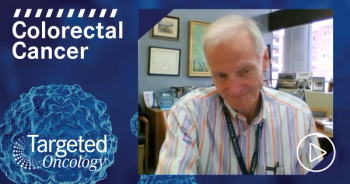
Case 1: Genomic Testing & NCCN Guidelines for Metastatic CRC
EXPERT PERSPECTIVE VIRTUAL TUMOR BOARDShubham Pant, MD:So this is aBRAF-mutant colorectal cancer patient who has failed frontline therapy. Greg, can you tell us about the importance of genomic testing in colorectal cancer?
Gregory Riedlinger, MD, PhD:Genomic testing has become standard of care for metastatic colon cancer. The NCCN [National Comprehensive Cancer Network] guidelines now recommend that all metastatic colon cancer patients be tested forKRAS,NRAS, andBRAFV600E. WithKRASandNRAS, we have extendedRAStestingnot only exon 2 but also exon 3 of theROSandKRASgenes, because those are shown to correlate with lack of response to anti-EGFR therapies.
Shubham Pant, MD:Wonderful. Richard, do you test your patients? When that frontline metastatic colorectal cancer patient comes to you, what all do you tend to test for?
Richard Kim, MD:I think molecular profiling is a must for any patient who’s diagnosed with advanced colorectal cancer. It’s recommended by the NCCN and ASCO [American Society of Clinical Oncology] guidelines. The typical molecular profile we do up front looks at theRASstatus to see if they’re a candidate for an EGFR drug. Otherwise, we test forBRAF.BRAFhas some significance. First, it is a prognostic marker. We know that a patient with aBRAFmutation tends to have a very poor prognosis. Their median survival is not your typical 2 to 3 years. It is probably less than thatanywhere from 18 to 20 months. For those patients, we tend to be very aggressive. The third type of testing we do is for immunotherapy—MSI [microsatellite instability] status.
Shubham Pant, MD:Just to be clear, we test forBRAF, extendedRASwhich is aKRASandNRASand then we do MSI testing. Mike, in your practice, when this result comes back and you see that the patient has aBRAFV600E mutation, what type of discussion do you have with your patient? What do you tell them? Do you say, “You’ve got aBRAFmutation. I’m going to start you now?” Do you wait until the second line or third line? How do you treat your patients who haveBRAFV600E-mutated colorectal cancer if you’ve tested them in the frontline, and you know that the mutation is there?
Michael Morse, MD:One of the challenges that we face right now with all of this molecular testing is trying to explain it to our patients. This is terminology that people typically haven’t heard before. The first thing is just to try to get people to understand their disease and what the meaning of these results is. For the average nonscientific person, we’ll explain that they have a certain mutation in their cancer, which has some prognostic significance, as Richard pointed out. There are therapies that can now be used to target that. However, as we all know, the data, as you presented, are in people who had 1 or 2 prior therapies. Even with the NCCN guidelines, people really should get a standard therapy in the first line and then be considered for something that targets theBRAFandEGFRgenes, subsequently. Basically, we explain that we’re going to give a standard therapy, but if that doesn’t work, we have optionseither on study or off study—for targeting that mutation.
Shubham Pant, MD:In the first line, Richard, that’s what you treat them withlike a chemotherapy with a backbone of…
Richard Kim, MD:Let’s say that a patient with aBRAFmutation has a poor prognosis. We want to be aggressive. These are not the patients who are going to get first-, second-, third-, or fourth-line therapy. If they’re young and they’re healthy enough to tolerate chemotherapy, I tend to be aggressive. Based on the TRIBE study, I would technically go with FOLFOXIRI [folinic acid, fluorouracil, oxaliplatin, and irinotecan] plus bevacizumab. It will be my first-line choice, assuming they’re able to tolerate it.
Then, once they fail that, like Mike said, that’s when you would try to bring in some of the BRAF inhibitors plus an EGFR drug. Once again, the data that you just presented show a response rate of 48%. If you look at the patient who actually progressed after 1 night of therapy, the response rate is actually higher60%. In the second-line setting, 60% response is pretty high. So, in those patients who failed FOLFOXIRI plus bevacizumab as second-line therapy, based on the BEACON study—once again, it was a very small study—I would tend to try to get the BRAF inhibitor plus the EGFR drug, if possible.
Shubham Pant, MD:Mike, you talked about the NCCN guidelines. I understand that it has been incorporated into the NCCN guidelines…?
Michael Morse, MD:Yes, based on the SWOG data. The NCCN guidelines really talk about using the combination that was used in that studyirinotecan, cetuximab, and vemurafenib. Obviously, we eagerly await the results of the combination of encorafenib, binimetinib, and anti-EGFR therapy to see what the future may bring for these patients. Right now, the challenge is always the insurance and whether insurance will cover these off-label uses. I think we have a stronger case now that the SWOG randomized trial was actually reported out.
Shubham Pant, MD:So what we are saying is, it’s not FDA approved, but it is part of the NCCN guidelines.
Transcript edited for clarity.








































